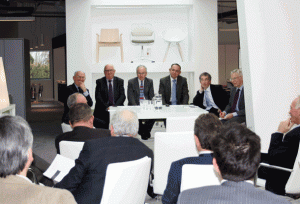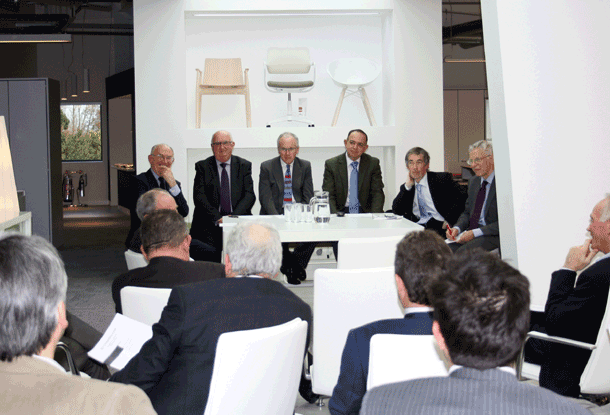 A meeting between the Silk Commission and some of Wales’ leading businesses took place on Thursday 11th April at the Cardiff headquarters of leading office design and furniture company, Paramount Interiors. Organised by Paramount’s Managing Director, Nigel Roberts, the consultation meeting was arranged to give businesses the opportunity to put forward their views on the proposals made by the Commission’s first report, which recommended devolving tax and borrowing power to the National Assembly.
A meeting between the Silk Commission and some of Wales’ leading businesses took place on Thursday 11th April at the Cardiff headquarters of leading office design and furniture company, Paramount Interiors. Organised by Paramount’s Managing Director, Nigel Roberts, the consultation meeting was arranged to give businesses the opportunity to put forward their views on the proposals made by the Commission’s first report, which recommended devolving tax and borrowing power to the National Assembly.
Established in October 2011 the independent Silk Commission was set up to examine the powers of the National Assembly for Wales. In November 2012 it published its first report, which looked in to the financial accountability of the Assembly. In total 33 recommendations were made covering tax, borrowing, business rates, stamp duty, landfill tax, aggregates levy and long-haul rates for Air Passenger Duty. The report is currently with the UK Government for consideration and any recommendations which are taken forward on sharing income tax will be subject to a referendum.
The Commission is currently working on the second part of its remit to review the non- financial powers of the Assembly and has previously stated its desire to canvass the views of individuals, businesses and organisations within Wales on how devolution could be improved. Chairman of the Silk Commission, Paul Silk, was invited by prominent South-Wales businessman and Managing Director of Paramount Interiors, Nigel Roberts, to attend a meeting at its company headquarters.
A group of senior executives from a cross section of domestic companies and the Welsh offices of international companies were invited to the meeting. Those represented included Arup, Gambit Corporate Finance, Target Group, HSBC, Quantum Actuarial, Vans Direct, Elinia Webservices, BRE, Lee Wakemans, SPTS as well as Paramount Interiors.
Commenting on the meeting, Nigel Roberts said “The recommendations in the Commission’s first report could have a major impact on Welsh businesses if they are adopted. I therefore thought that it was crucial that businesses had the opportunity to have their say on what powers they believe the Welsh Assembly should have. It’s vital that we put some commercial focus on some of the proposals that have been made and give our views on what we believe the Assembly should be doing to improve the business environment and the competitiveness of Welsh companies. We are grateful to Paul Silk and his team for taking the time to meet with us and we hope that the open and honest discussions that took place gave them some food for thought, which they will urge the Assembly to act upon. ”



















